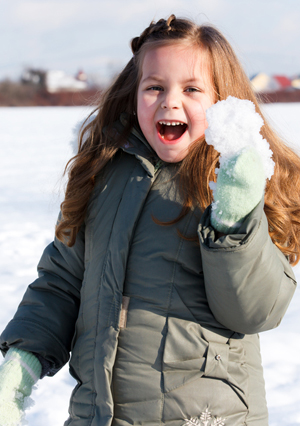
While we might dream of great white mounds of snow forcing schools to close, snow days often throw an unexpected kink into lesson planning.
 December and January have the highest rates of snow days nationwide, but late-spring snowstorms are notorious for catching us off guard in cold-weather climes. Here are a few tips for making it through winter storms with as little interruption to learning as possible.
December and January have the highest rates of snow days nationwide, but late-spring snowstorms are notorious for catching us off guard in cold-weather climes. Here are a few tips for making it through winter storms with as little interruption to learning as possible.
Prepare students
Sometimes, before snow even hits the ground, distracted students become too obsessed with incoming winter weather to focus on their studies. If there is a potential snow day on the horizon, it can be good to prepare students with alternative plans before the flakes fall.
Combine reading assignments with videos for a temporary flipped-classroom model. On a snow day, students can still try to work through problems related to the videos and return with any questions they might have. You may still have to review some of the information, but it will go a lot quicker if students already know the basic content.
Khan Academy, TED talks and even YouTube channels like Crash Course or SciShow provide great videos — though you can also make your own. While students are out of class, consider using email, Edmodo or Google Classroom to stay connected. They can ask questions or even have larger discussions about course material.
Hold virtual class
If your school has one-to-one electronics and every student has access to a working laptop or iPad, holding “virtual class” is a possibility. Using shared documents, groups of students can work on a piece of writing while also getting teacher feedback.
If students have a writing assignment on the horizon, a snow day can be an excellent time to encourage them to connect with each other or the instructor and work on their assignments.
They also can use supplementary websites like Dreambox or IXL if your district provides access. This doesn’t replace in-class work, but it can help students keep school on their minds while the snow piles up outside.
Remember students who lack internet or device access
It is also important to remember that some students may not have ready access to the internet. Closed libraries, socioeconomic realities or power outages may affect your ability to connect with students virtually.
If large portions of your students lack access to Wi-Fi or suffer from power outages, prepare them for snow days by encouraging reading and writing. Even students who have ready access to Wi-Fi or cable TV could benefit from a nice long read over the break. When students return, have them discuss what they read.
Get back to where you once … learned
When students return from snow days, it can be difficult to pull them back into a classroom mindset. Rather than fighting the battle, some teachers design snow-specific lessons. On her blog Teach Train Love, teacher Bevin Reinen describes having students “make it snow” by creating short writings, crumpling them into snowballs and tossing them in the air. Expanding this idea, students can work on building paragraphs or short stories this way, having them pick up a snowball, add their own sentence, then tossing it back into the center of the room.
This will be an energetic exercise, but after a few minutes, have students sit down and listen to each others’ writing. This will help them calm down and get back into a school mindset.
Build in breaks
Just as school years are sometimes built to accommodate snow days, consider crafting unit and lesson plans over the winter months that can absorb a day off. Instead of too much material for too few days, you’ll be faced with cutting work days rather than content days. Building some extra padding into the schedule can help avoid the snow day adjustment freak-out.
Finally, have mercy
Students may be overwhelmed when they return from canceled school. They often understand how much work and homework they might face. Sophia Mapua, reporter for The Chant newspaper at North Cobb High School, once covered student snow day anxiety and offered advice to students returning to mounds of work, describing how faculty and students alike faced stress and challenges from snow days.
It’s important to remember that sometimes teachers — and students — just need a day off. If a snow day comes and you’ve got padding in your schedule, consider doing … nothing. It might well be time for you to sit down with a good book and relax a bit too.
Monica Fuglei is a graduate of the University of Nebraska in Omaha and a current faculty member of Arapahoe Community College in Colorado, where she teaches composition and creative writing.
Categorized as: Tips for Teachers and Classroom Resources
Tagged as: Engaging Activities, New Teacher, Professional Development